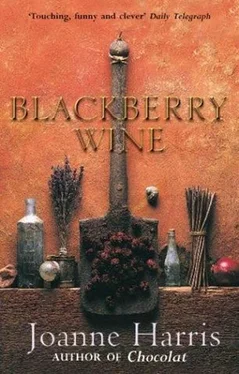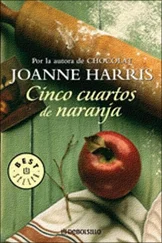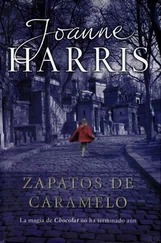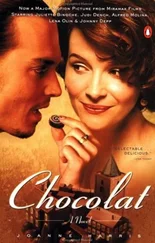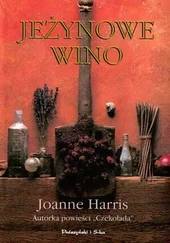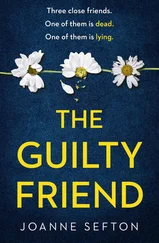‘Aye.’ Joe looked at the plants with satisfaction. ‘Mebbe the soil’s right just as it is.’
That morning, too, another letter from Nick arrived, with news of two more offers from publishers for Jay’s incomplete novel. These were not final offers, he said, though already the sums involved seemed extravagant, almost ridiculous, to Jay. His life in London, Nick, the university, even the negotiations on the novel seemed abstract here, eclipsed by even the small damage caused by an unexpected rainstorm. He worked in the garden for the rest of the morning, thinking of nothing at all.
AUGUST WAS FREAKISHLY WET FOR LANSQUENET. RAIN EVERY other day, overcast the rest of the time, and with winds which lashed at crops and stripped their leaves. Joe shook his head at this and said he expected it. He was the only one. The rain was merciless, stripping away topsoil and washing tree roots bare. Jay went to the orchard in the rain and used pieces of carpet to wrap around the bases of his trees to protect them from water and rot. It was another old trick from Pog Hill Lane, and it worked well. But without adequate sunshine the fruit would fall unformed and unripened from the branches. Joe shrugged. There would be other years. Jay was not so sure. After the old man’s return he had become preternaturally sensitive to the changes in Joe, marking every change of expression, going over every word. He noticed that Joe spoke less than he had before, that sometimes his outline was blurry, that the radio, tuned permanently to the oldies station since May, sometimes played white noise for minutes before finding a signal. As if Joe, too, were a signal, gradually fading into oblivion. Worse, he had the feeling that it was somehow his fault that it was happening, that Lansquenet was somehow taking over – eclipsing Joe. The rain and the falling temperature dampened the scents which were so characteristic of the old man’s appearances, the scents of sugar and fruit and yeast and smoke. During the past few weeks these too had faded, so that for unbearable moments Jay felt absolutely alone, bereaved, a man sitting at a dying friend’s bedside, listening for the next breath.
Since the wasp incident Marise no longer avoided him. They greeted each other over the fence or the hedge, and though she was rarely exuberant or forthcoming, Jay thought Marise had begun to like him a little. Sometimes they talked. September was a busy time for her, with the grapes fully formed and beginning to turn yellow, but the rain, which had not really given up since last month, was causing renewed problems. Narcisse blamed the disastrous summer on global warming. Others muttered vaguely about El Niño, the Toulouse chemical plants, the Japanese earthquake. Mireille Faizande curled her lip and talked about Last Times. Joséphine remembered the dreadful summer of ’75, when the Tannes dried up and rabid foxes came running out of the marshes into the village. It did not rain every day, but even so the sun was barely present, a tarnished coin in the sky, giving little warmth.
‘If it goes on like this there won’t be any fruit for anyone this autumn,’ said Narcisse dourly. Peaches and apricots and other soft-skinned fruit were already done for. The rain ate through the tender flesh and they dropped, rotten, to the ground, before they had even finished developing. Tomatoes failed to ripen. Apples and pears were hardly any better. Their waxy skin might protect them to some extent, but not enough. Vines were the worst.
At this stage the grapes needed sunlight, Joe said – especially for the later harvests, the Chenin grapes for the noble wines, which had to be sun-dried, like raisins. These grapes rely on the exceptional conditions of Lansquenet’s marshland: the hot, long summers, the mists which the sun brings from across the river. This year, however, the pourriture noble had nothing noble about it. Rot, pure and simple, set in. Marise did what she could. She ordered plastic coverings from town, which she fixed into place over the rows of vines with the help of metal hoops. This saved the vines from the worst of the rain, but did nothing to protect the exposed roots. Any sunlight was hampered by the presence of the sheets, and the fruit sweated inside the plastic. The earth had long since been trodden into mud soup. Like Joe, she laid pieces of carpeting and cardboard between the rows to avoid further damage to the ground. But it was a futile gesture.
Jay’s own garden fared a little better. Further from the marshland, raised above the water level, his land had natural drainage channels, which carried excess water down to the river. Even so the Tannes rose higher than ever, spilling out across the vineyard on Marise’s side, and cutting dangerously close on Jay’s, eroding the banking so sharply that great slices of earth had already fallen into the river. Rosa was under instructions not to approach the damaged banking.
The barley was a disaster. Fields all around Lansquenet had already been abandoned to the rain. In one of Briançon’s fields a crop circle appeared, and the more gullible of Joséphine’s drinkers began to speculate about space aliens, though Roux thought it more likely that Clairmont’s mischievous young son and his girlfriend knew more than they were telling. Even the bees were less productive this year, Briançon reported, with fewer flowers and poor-grade honey. Belts would have to be tightened throughout the winter.
‘It’s hard enough getting the money from this year’s crop to plant next spring,’ explained Narcisse. ‘When the crop’s bad, you have to plant on credit. And with rented land becoming less and less viable, héh !’ He poured Armagnac carefully into the hot dregs of his coffee and downed it in a single mouthful. ‘There’s not enough money in sunflowers or maize any more,’ he admitted. ‘Even flowers and nursery produce aren’t making what they used to. We need something new.’
‘Rice, maybe,’ suggested Roux.
Clairmont was less downcast, in spite of poor business throughout the summer. Recently, he had been north with Lucien Merle for a few days, returning full of enthusiasm for his Lansquenet project. It transpired that he and Lucien were planning to go into partnership on a new scheme to promote Lansquenet in the Agen region, though both of them seemed unusually secretive about the matter. Caro, too, was arch and self-satisfied, calling at the farm twice ‘in passing’, though it was miles out of her way, and staying for coffee. She was full of gossip, delighted with the way Jay had renovated the farm, intensely curious about the book and hinting that her influence with the regional literary societies would be certain to make it a success.
‘You really should try to get yourself some French contacts,’ she told him naively. ‘Toinette Merle knows a lot of people in the media, you know. Perhaps she could arrange for you to give an interview to a local magazine?’
He explained, with an attempt not to smile, that one of the main reasons for escaping to Lansquenet had been to avoid his media contacts.
Caro simpered and said something about the artistic temperament.
‘Still, you really should consider it,’ she insisted. ‘I’m sure the presence of a famous writer would give us all the boost we need.’
At the time Jay barely paid attention. He was close to completing the new book, for which he now had a contract with Worldwide, a large international publisher, and had set himself a deadline of October. He was also working on improving the old drainage channels on his land, with the aid of some concrete piping supplied by Georges. His roof, too, had developed a leak, and Roux had offered to help him mend it and repoint the brickwork. His days were too busy to give much time to Caro and her plans.
Читать дальше
